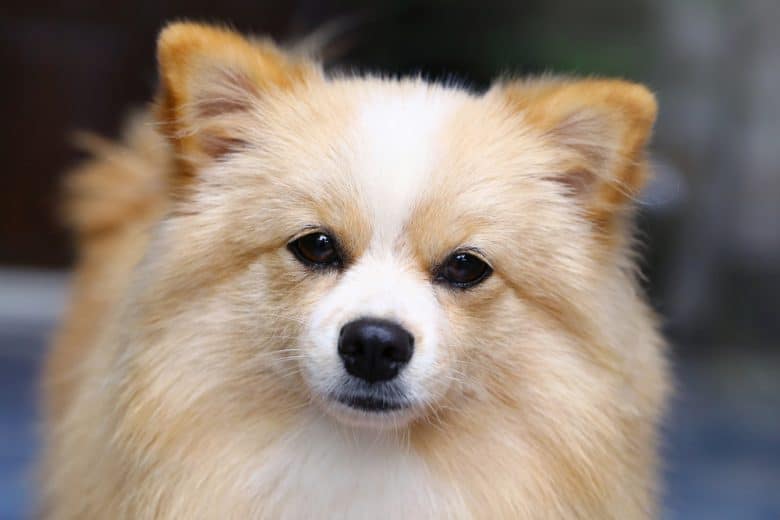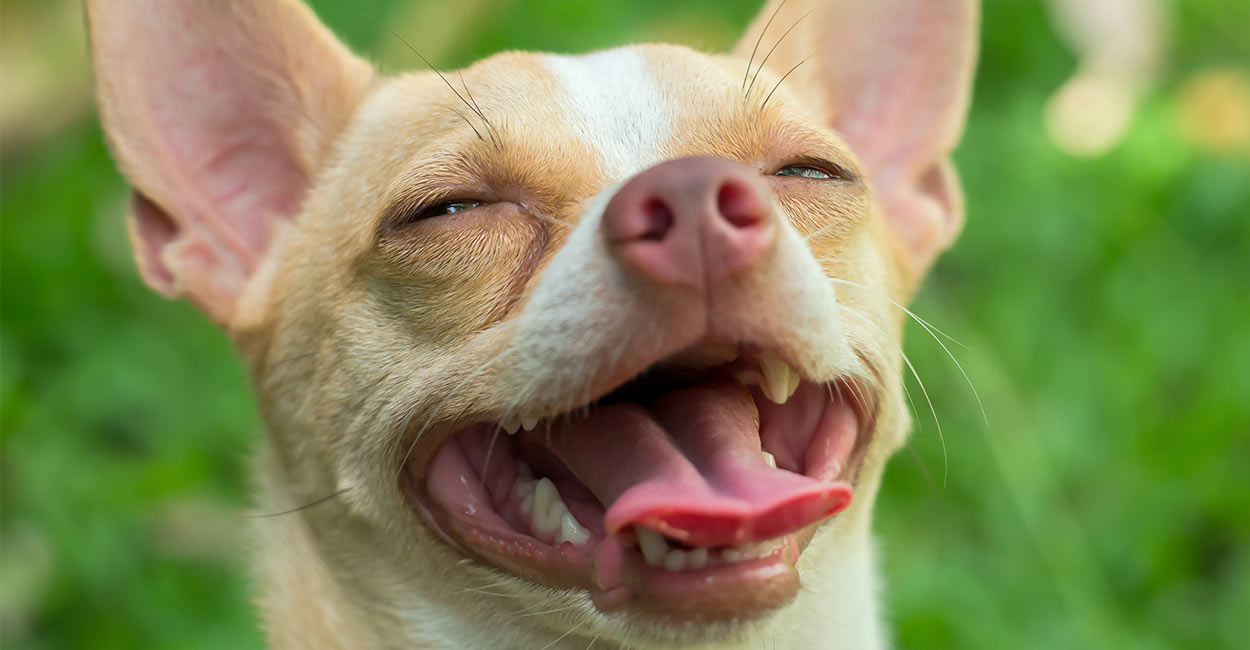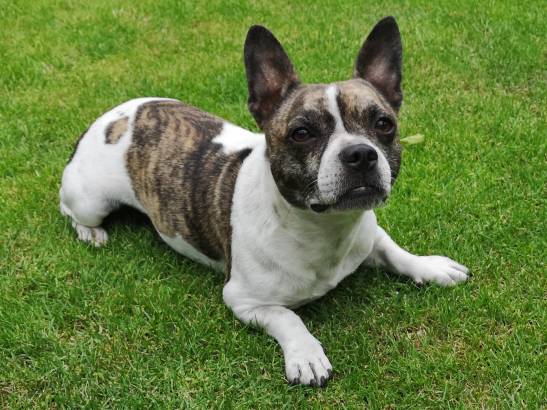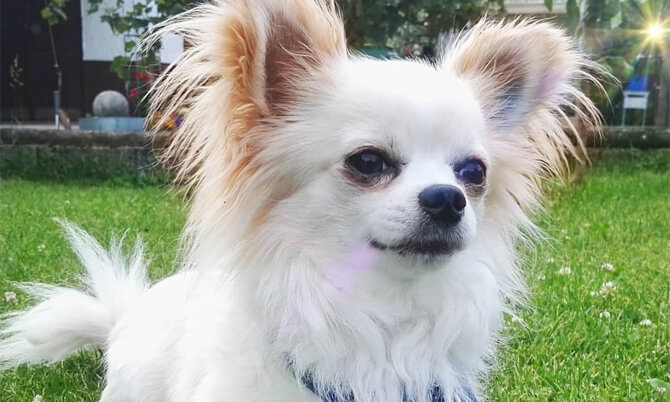Connect with a verified veterinarian in minutes. Licensed vets are available 24/7 to answer your questions. No need to worry about your furry family member.
What happens when you mix a Pomeranian and a Chihuahua? The answer is a Pomchi, of course! These little dogs are darling and have way of wrapping their little furry paws around your heart!
If you’re interested in adopting a Pomchi, then you’ve come to the right place. Here, you’ll find information about the Pomchi breed, temperament and characteristics, as well as how to care for your little ball of fur!
What is a Pomchi?
A Pomchi is a mix between a Pomeranian and a Chihuahua. The result is a small breed with lots of personality and energy! You may also hear them referred to as a Chi-Pom, Chimeranian, Chiapom, Chiranian, Pomahuahua, and Pomachi. That’s quite a mouthful—say those names 10 times fast! We dare you!
This Pomeranian and Chihuahua mix is a designer dog, and that was created to meet the growing demand for cute, little dogs—fueled by the famous stars who had these pooches. No one is quite sure where these cute dogs first originated, but they seem to have been in the U.S. for about the last 30 years.
Enthusiasts of the breed are looking to create a hybrid line of Pomchis, that by the 7th generation could be designated a purebred dog with the canine registries.
As these are hybrid dogs, you’ll need to understand that each dog and puppy are unique individuals. They may resemble their parents, but have completely different personalities, physical traits, and more. A puppy can have traits from either of its parents—and puppies even from the same litter may vary in their looks and in the way they behave.
Having said that, it’s also important to remember that each little ball of fur is a separate living little creature. Each one deserves to be treated with love and cared for in a fur ever home. They precious little lives who need you and want to be your companion for years to come.
This dog breed is considered to be very active and loving. They make great family dogs, and are usually good with other pets, too. However, be aware that they can be high-energy and need plenty of exercise. You’ll also want to be prepared to give them plenty of tummy rubs—these dogs love to be loved on!
Just like any other mixed breed dog, you’ll need to be prepared to take your Pomchi to the vet for regular check-ups and vaccinations. And just like with any other dog, be sure to socialize your Pomchi well—they need people around them to be happy and healthy. Crossbreed dogs are usually quite friendly, but they can also be independent and stubborn.
While watchdogs are not typically a breed of dog that people think of when they think of Pomeranians and Chihuahuas, the Pomchis are very active and love to explore. They are also very curious and may be too much for some families. If you’re looking for a dog that will primarily stay in one spot, then this may not be the right breed for you.
Two Breeds: Pomeranian Chihuahua Mix
The mix of two dogs can result in some surprises, so it’s always a good idea to learn who the parents are before buying a puppy. If you adopt from a shelter, it may not be possible to see the parents. However, if you choose to adopt from a breeder, then always ask to see the parents. See what the parents’ temperaments are, how they react to you, etc. It’s also a good idea to see the puppy’s litter mates, if possible.
Toy breeds are typically not good candidates for mixes, as they may not have the temperament to handle a more active dog. However, the Pomchi is a toy breed that is typically gentle and easy to care for. So, if you’re looking for a small dog that’s not too active, the Pomchi may be the perfect choice!
Pomeranians
Pomeranians, also called Poms, came from the German Spitz. These were large working dogs and they were named after the area in Germany known as Pomerania. This area is now part of Germany and Poland. In those days, Pomeranians were large and used as working dogs for herding cattle. Over time and with selective breeding, the breed’s size grew smaller. In the 1800s, these dogs were about half their original size and were used as companion dogs.
Pomeranians are outing dogs who love to be social. The Pomeranian parent is usually a designer breed. This means that they’re not bred for any specific purpose, but are instead chosen for their looks and temperament. Non-designer breeds are usually less expensive than designer breeds, but you don’t get the same level of quality. That being said, the Pomeranian is a sweet dog that’s great with children. They’re also relatively easy to care for, making them a great choice for first time dog owners.
Chihuahua
The Chihuahua comes from an ancient line of dogs. In fact, there records in Mexico that go all the way back to 100 AD. During this time, the Aztecs sometimes used the dogs as “hot water bottles” when someone was sick. By this, we mean the dogs were used to help keep the person warm. They were not used literally as hot water bottles!
The Chihuahua was official declared a breed in the 1850s and was named after the Mexican state of Chihuahua. They were brought to the US in the 1800s. These little dogs are known for their confidence, bravery and for being highly alert. In some ways, they’re very much like terriers.
There are many Chihuahua varieties. Techichi, Teacup, Toy, Miniature, and Smooth Coated are just a few. The Chihuahua is a small dog, averaging between 8 and 12 pounds. They have a long, slender body with a pointed head and large eyes. The Chihuahua has a short coat that can be any color, but is usually light to dark brown with some patches of white.
The Chihuahua parent breed is usually a designer dog, meaning they’re bred for a specific purpose. Designer breeds are usually more expensive than regular breeds, but they’re worth it because you get a dog that’s specifically bred for your needs. Dog owners who want a small dog that’s not too fragile often choose the Chihuahua. Long haired Chihuahua puppies are also becoming more popular, because they have a unique look. The long hair can be combed down, but it can also be styled in a number of different ways. These lap dogs are also very active and love to play.

Review symptoms, medications & behavior to keep your pets healthy with a Vet Online in just minutes.
Ask a Vet Live NowPomchi Facts
These pretty small dogs are a hybrid mix, between a Pomeranian and a Chihuahua. They are used as companions, and they have a lifespan of 12-15 years. They are wonderful companions for adults, families that have older kids. And these dogs can live in apartments and cities with no problem.
Pomchis are usually between 6” to 9” high, and weigh about 5-12 lbs. When it comes to colors, you’ll find a wide range of variations including:
- Blue & tan
- Black & tan
- Sable
- Fawn
- Cream & chocolate
Speaking of their fur, Pomchis generally have long, short, dense, thin double or single coats. Thankfully, they don’t shed too much, though they do tend to shed in the spring and fall. When it comes to caring for their coats, your Pomchi needs to be brushed every day. They don’t deal well with mats and tangles, so do be sure to keep your fur baby’s hair brushed and smooth. As Pomchis do have sensitive skin, it’s a good idea to use brushes that have soft bristles—avoid metal brushes, as these can cause irritation.
The double coat of a Pomchi will protect them from the cold, while the short hair helps to keep them cool in the summer. They do well in most climates, but may be more susceptible to heatstroke in warmer climates. The undercoat is dense, so your Pomchi will stay warm in the winter. The Pomchi coat is also water resistant, so your Pomchi will be able to stay dry in the rain or snow.
Blue merle Pomchis are a rare color and may have some white in their fur. These dogs are usually very friendly and loving, but they can also be a little more independent than other Pomchis. Cute as they are, Pomchis do have some quirks that you’ll want to be aware of. For example, they can be very food-motivated and may become hyperactive if they don’t get their daily feeding.
As with all dogs, your Pomchi will need exercise. A good way to provide this is by taking them for a walk every day. However, be sure to check with your vet before starting any kind of vigorous exercise regimen, as this can be too much for a Pomchi’s little body.
Pomchis are considered toy dogs and should not be left unsupervised with other animals. They are good with children once they get to know them and are usually gentle dogs. However, like all dogs, they can become aggressive if they feel threatened or if their pack is threatened. As with all dogs, it’s always a good idea to socialize your Pomchi by playing with other dogs and going on walks.
Chihuahuas and Pomeranians are two of the most popular breeds in the world. Mixing these two breeds can result in a Pomchi—a delightful little dog that is both playful and loyal!
Because these dogs can suffer from skin allergies, it’s good to use a mild shampoo. Pomchis, like other dogs, also require regular nail clipping about every three months or so. They may also need to have their hair trimmed once in a while, especially if they have longer hair. Beware of hypoallergenic shampoos, as these can be very harsh on their skin. Groomers who specialize in Pomchi grooming will be able to help you with this.
Pomchis also benefit from having their teeth brushed on a regular basis because of their tendency to have dental problems. It’s a good idea to brush their teeth at least once a week, using a pet-safe toothpaste. Never use human toothpaste with a Pomchi or any other dog.
Pomchi Temperament
A Pomchi dog has a large personality but there’s a little mystery involved when trying discern your Pomchi puppy’s temperament. It just depends. Your dog could end up with a more Chihuahua personality, or with a Pom’s personality. When it comes to breeding, this isn’t an exact science. This is why even puppies from the same litter can be quite different from one another.
Chihuahuas are energetic, alert and lively little dogs. And they can be somewhat aggressive or nervous. They do have a reputation for being yappy, aggressive, and even for biting. These can all be true but remember that each dog is an individual. While these traits may be true in some dogs of this breed, other Chihuahuas can be quite complacent, quiet, and well-mannered.
On the other hand, the Pomeranian is known for being smart, curious and as a dog that loves to have some fun. They’re also obedient, and usually friendly. The small size of the Pomchi may make them seem timid or shy, but this is not always the case.
The Pomchi mix is a unique dog that has a lot of personality. They’re lively, playful and fun-loving. They’re also very loyal to their family and friends. While they may be somewhat unpredictable, they’re usually very easy to train. Small children and other animals should be supervised when around a Pomchi mix, as they may be too playful for some children and could nip them.
Pomchis like to cuddle and are very affectionate. They’re also quite active and will need plenty of exercise. These little dogs love to play fetch, run around, and play “hide and seek”.
These small dogs can suffer from separation anxiety; in fact, they can become quite vocal when left alone too long. By this, we mean the dog may bark, whine and cry quite a bit.
In addition, Pomchis are known for barking at noises, as well as chewing, scratching, digging, urinating, and defecating when stressed.
Can these dogs be good for a family? Yes, but it’s usually best if the home doesn’t have young children. This is because the dog is so small and could easily be hurt by accident. Again, Pomchis don’t do well when left alone for long periods, so if you need to be away from home for long hours, then it’s best not to adopt one of these amazing little dogs. They will suffer when left alone too much.
One more note—smaller don’t always deal well with weather changes, so they should be inside dogs. This is also true of the Pomchi. In cold weather, they may enjoy wearing a doggie coat to stay warm, and they will definitely enjoy being inside when it’s too hot out.
Pomchi Health
Pomchis are unfortunately prone to certain health conditions carried by Chihuahuas and Pomeranians. If the dogs come from a responsible breeder, chances are the dogs will be pretty healthy. These lively little dogs can suffer from:
- Cataracts
- Progressive retinal atrophy
- Hypothyroidism
- Dental and gum disease
- Epilepsy
- Patellar luxation
- Allergies
- Hypoglycemia
- Heart problems
- Hip dysplasia
- Collapsed trachea
- Hydrocephalus
- Legg-Perthes
- Open fontanel
- Shivering
For this reason, if you get your fur baby from a breeder, ask them for a health certificate. The certificate will state the dog is healthy and doesn’t suffer from certain conditions. In addition, the health certificate should also state the parents are healthy, too.
The kneecaps of the Pomchi are particularly susceptible to conditions such as luxating patellas, which is a problem with the kneecap that can cause it to pop out of its socket.
This is a painful condition and requires surgery to correct. Other health problems that Pomchis may be prone to include obesity, breathing problems, dental problems, and thyroid disease.
As with any dog, regular vet check-ups are a must for your Pomchi. And if you do have any concerns about your Pomchi’s health, be sure to talk to your vet about them.
Pomchi Care
While these dogs are lively, they don’t require much exercise. In fact, they are with a 30-minute walk, playing in the house or yard. One note, if you take your Pomchi on a walk, make sure to keep him on the leash. They are not known for responding to your calls when they run off!
Pomchis really need to be well socialized starting from a young age. They do well with reward-based training, which means positive reinforcement, though they can be stubborn. You’ll need to have some patience as you work with your little dog! But don’t give up! They respond well to food treats and praise as rewards!
Dog food is also important for Pomchis. They should have a high-quality diet that includes both meat and vegetables. Kibbles and Bits are a good option. And don’t forget to give your Pomchi plenty of water!
Pomeranian Chihuahua Puppy
Are you looking to adopt a Pomchi puppy? Are you looking for a breeder? A Pomeranian Chihuahua mix puppy can be found; however, you’ll need to find a reputable breeder first. It’s best to avoid puppy mills and pet shops. In the pet shop, the puppies may be darling, but chances are they have come from a puppy mill. These dogs could have been inbred, not socialized or cared for properly. They’re also more prone to higher rates of genetic health issues.
On the other hand, a Pomchi puppy from a reputable breeder will be healthy, happy, and socialized puppy. If you’re not sure how to find a breeder, ask your vet if they can provide a reference. You could also ask your family, friends, and colleagues if they know of a reputable Pomchi breeder.
Once you find a breeder, it’s always recommended that you go and visit their home. Ask questions, ask to see the litter and the parents, and request a tour of the kennels. That way you’ll be able to see how the dogs are cared for, if they have clean kennels, food and water, etc. And remember to ask for a health certificate that shows the parents are free of genetic health issues and the puppy is healthy.
These little dogs can have huge personalities and some temperament issues; however, a Pomchi can make a wonderful companion. With the proper socialization and training, you’ll have a loving little companion by your side each and every day!
Connect with a verified veterinarian in minutes. Licensed vets are available 24/7 to answer your questions. No need to worry about your furry family member.

Kyoko
Kyoko is from a family of 3 and moved to New York with her parents and siblings when she was 13. Kyoko is fond of spending a great amount of time with pets, specifically her beagle Luna and cat Missy. Her boyfriend often complains that she spends too much time giving attention to their animals. Kyoko has written dozens of articles concerning pets and is aiming at owning a pet shop one day!
Review symptoms, medications & behavior to keep your pets healthy with a Vet Online in just minutes.
Ask a Vet Live Now




